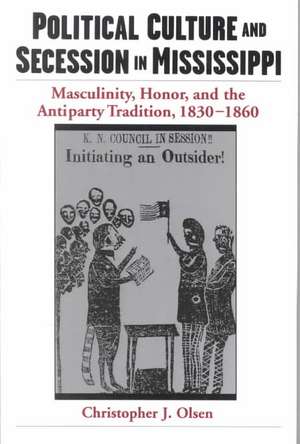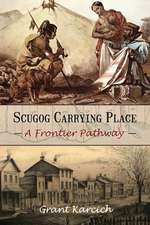Political Culture and Secession in Mississippi: Masculinity, Honor, and the Antiparty Tradition, 1830-1860
Autor Christopher J. Olsenen Limba Engleză Paperback – noi 2002
| Toate formatele și edițiile | Preț | Express |
|---|---|---|
| Paperback (1) | 459.98 lei 32-37 zile | |
| Oxford University Press – noi 2002 | 459.98 lei 32-37 zile | |
| Hardback (1) | 504.91 lei 32-37 zile | |
| Oxford University Press – 9 noi 2000 | 504.91 lei 32-37 zile |
Preț: 459.98 lei
Preț vechi: 567.27 lei
-19% Nou
Puncte Express: 690
Preț estimativ în valută:
88.02€ • 90.94$ • 73.22£
88.02€ • 90.94$ • 73.22£
Carte tipărită la comandă
Livrare economică 10-15 martie
Preluare comenzi: 021 569.72.76
Specificații
ISBN-13: 9780195160970
ISBN-10: 0195160975
Pagini: 304
Ilustrații: 10 halftones, maps & line illus
Dimensiuni: 152 x 228 x 16 mm
Greutate: 0 kg
Ediția:Revised
Editura: Oxford University Press
Colecția OUP USA
Locul publicării:New York, United States
ISBN-10: 0195160975
Pagini: 304
Ilustrații: 10 halftones, maps & line illus
Dimensiuni: 152 x 228 x 16 mm
Greutate: 0 kg
Ediția:Revised
Editura: Oxford University Press
Colecția OUP USA
Locul publicării:New York, United States
Recenzii
"Well researched and carefully crafted...merits the attention of historians of the late national period, particularly those interested in the South, Mississippi particularly, and the sectional crisis." --Georgia Historical Quarterly
"An excellent book on both the culture of southern secession and the persistance of antiparty values in mid-nineteenth century America. What [he] says about local political culture should command the attention of political historians for some time to come." --The North Carolina Historical Review
"This analysis is a useful addition to the growing corpus reinterpreting the mind and spirit of the antebellum South."--Choice
"An excellent book on both the culture of southern secession and the persistance of antiparty values in mid-nineteenth century America. What [he] says about local political culture should command the attention of political historians for some time to come." --The North Carolina Historical Review
"This analysis is a useful addition to the growing corpus reinterpreting the mind and spirit of the antebellum South."--Choice
Notă biografică
Christopher J. Olsen is Assistant Professor of History at Indiana State University.









